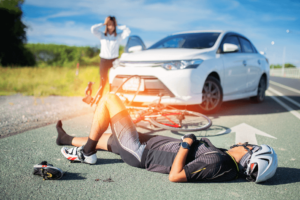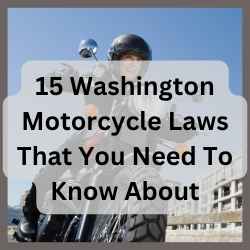
Motorcycle accidents present some of the gravest risks on our roads. Here in Bellevue, Washington, the consequences of these collisions can be life-altering—for riders and their families alike. If you or a loved one has found yourself facing the aftermath of a motorcycle accident, a clear understanding is crucial: what causes these crashes, why motorcycle accidents are more fatal than car collisions, how to document the scene after a motorcycle accident for evidence, the best protective gear to avoid severe injuries in motorcycle accidents, and—most importantly—what legal steps to take after a motorcycle crash injury.
At R Martin Law Group, we combine national-level expertise and local knowledge to help you navigate these difficult times with confidence and dignity. Mr. Rich Martin, a personal injury attorney recognized among the National Top One Percent, leads our team in providing outstanding results for those injured in motorcycle accidents.
Let’s dive into everything you need to know, arming you with knowledge, practical tips, and the legal insights to protect your rights.
Why Are Motorcycle Accidents More Fatal Than Car Collisions?
When you hit the open road on two wheels, the sense of freedom is exhilarating—but so are the risks. Motorcycle accidents are exponentially more dangerous than typical car accidents. In 2023, motorcyclists comprised a staggering 15% of U.S. traffic fatalities, with over 6,300 deaths—a rate about 28 times higher per mile traveled than car occupants.(WADOT)
Here’s why motorcycle accidents are so often catastrophic:
- Minimal Protection: Unlike cars with seat belts, airbags, and crumple zones, motorcycles offer little between the rider and the road. In a crash, the rider is entirely exposed to impact forces and environmental hazards.
- Higher Vulnerability: Road debris, potholes, slick surfaces, and even abrupt weather changes can send a motorcycle off balance, while these same hazards might barely faze a car.
- Visibility Issues: Motorcycles are notoriously harder for other drivers to detect, especially in blind spots or at intersections. Studies confirm that the majority of multi-vehicle motorcycle collisions happen because car drivers simply didn’t see the motorcyclist.
- Speed and Maneuverability: The agility of motorcycles, while a pleasure in skilled hands, poses unique dangers—especially when riders or motorists distract themselves, make sudden moves, or fail to anticipate each other’s behavior.
It’s not just about numbers; it’s about lives, families, and futures forever altered in a split second.
Common Causes of Motorcycle Accidents in Bellevue & Beyond
To protect yourself, you must know the most frequent causes of motorcycle accidents:
1. Collisions with Other Vehicles
Most motorcycle accidents involve other motorists—often in deadly head-on crashes or when cars make left turns in front of oncoming bikes. In such scenarios, visibility and the other driver’s inattention lead to tragedy far too often.
2. Intersections
Intersections are hotspots for motorcycle accidents, especially when a vehicle misjudges the speed or presence of a motorcycle. Watch for cars turning across your path—it’s one of the deadliest situations on the road.
3. Distracted or Impaired Driving
Both motorcyclists and other drivers are guilty of distractions—texting, fiddling with tech, or worse, driving under the influence. A single lapse in attention can mean disaster when motorcycles and cars share the road.
4. Dangerous Road Conditions
Potholes, loose gravel, wet leaves, and even uneven pavement pose outsized threats. What a car might see as a mild bump can cause a motorcycle crash in the blink of an eye.
5. Mechanical Failures
Blown tires, malfunctioning brakes, or other mechanical failures can precipitate sudden loss of control—sometimes with catastrophic results.
The Most Common and Severe Injuries from Motorcycle Accidents
Let’s be frank—when motorcycle accidents happen, injuries are often severe, sometimes catastrophic. Commonly seen injuries include:
- Head & Brain Injuries: Even with a helmet, traumatic brain injuries (TBIs) are a frequent and devastating consequence.
- Spinal Cord Injuries: Damage can result in partial or total paralysis, with lifelong medical needs and rehabilitation.
- Broken Bones: Fractures are nearly routine, usually affecting legs, arms, ribs, and the pelvis.
- Internal Injuries: Blunt-force trauma can damage organs, leading to bleeding or loss of organ function.
- “Road Rash”: Severe skin abrasions from sliding across concrete and asphalt are not only painful—they can lead to infection and permanent scarring.
The Best Protective Gear To Avoid Severe Injuries In Motorcycle Accidents
Your greatest line of defense is the right safety gear. Here’s what the pros recommend—and what the law sometimes requires:
- DOT-Approved Helmets: Enormously effective in lessening the risk and severity of head injuries. Washington law mandates helmet use for all motorcycle riders.
- Armored Jackets and Pants: Heavy-duty materials (like Kevlar or reinforced leather) with built-in armor at key impact points protect against abrasions and fractures.
- Gloves: Safeguard your hands from cuts, bruises, and burns.
- Motorcycle Boots: Above-the-ankle boots stabilize and protect the feet and lower legs.
- Eye Protection: Goggles or visors shield your eyes from debris and wind, improving visibility at high speeds.
- High-Visibility/Reflective Clothing: Make yourself seen—bright colors, reflective vests, and always-on headlights give other drivers more time to spot you.
Investing in top-quality protective gear is not just about safety—it’s about giving yourself and your loved ones the best possible odds.
What Legal Steps to Take After a Motorcycle Crash Injury
When a motorcycle accident happens, your actions in those first minutes and hours can make or break your legal case. Here’s a clear road map to guide you:
1. Ensure Everyone’s Safety, Call 911
Your health comes first! Move to safety if possible and seek prompt medical help for everyone involved. Do not leave the scene.
2. Never Admit Fault
Even if you feel partially responsible, avoid admitting fault or making statements to other parties—you might be mistaken, and anything you say can be used against you in claims or court.
3. File an Official Police Report
Request that law enforcement come to the scene and file a police report. Ask how to get a copy—the details are crucial for insurance and legal claims.
4. Document Everything
How to document the scene after a motorcycle accident for evidence:
- Take wide-angle shots and close-ups of all vehicles, license plates, damage, debris, skid marks, and road conditions.
- Photograph weather conditions, traffic signals, street signs, and anything contributing to the accident.
- Snap pictures of injuries (no matter how minor they appear), road rash, torn clothing, and protective gear.
- Gather contact and insurance info from all other drivers and witnesses. Record witness statements with your cell phone, if possible.
- Jot down your own recollection of events while the details are fresh—time, location, direction of travel, and what happened before/during/after the impact.
5. Get Prompt Medical Care
Even if you feel fine, see a doctor. Adrenaline can mask symptoms, and some injuries (like hidden internal bleeding or head trauma) manifest hours later. Detailed medical records are vital proof for injury claims.
6. Notify Your Insurance—But Be Cautious
Contact your insurance company to report the accident. Provide factual, concise information. Don’t speculate, blame, or elaborate—let your attorney handle the heavy lifting with insurers.
7. Preserve Physical Evidence
Hang on to your helmet, damaged gear, and the motorcycle itself until an attorney reviews your case or your insurer gives the green light. These items may play a decisive role in proving how the crash occurred.
8. Consult a Motorcycle Accident Attorney ASAP
Don’t go it alone. Contact R Martin Law Group to protect your rights from the very start. An experienced lawyer can help you:
- Understand legal obligations and timelines,
- Advise on communication with insurance companies,
- Investigate and gather key evidence,
- Negotiate with adjusters to maximize your settlement, and
- File lawsuits if necessary.
9. Track ALL Your Expenses
Save receipts for repairs, medical bills, prescriptions, lost wages, and every expense stemming from your injuries. Don’t forget pain, emotional distress, and loss of enjoyment of life—these intangible losses also deserve compensation.
How To Prove Fault In A Motorcycle Accident For Insurance Claims
Making an insurance claim after a motorcycle crash isn’t just about telling your side of the story. The burden of proof is on you (and your attorney) to show that the other party caused your injuries—while also defending you against blame-shifting tactics from insurers.
Crucial steps include:
- Evidentiary Documentation: Photographs, videos, witness statements, police reports, and accident reconstructions all help paint a clear picture.
- Medical Records: Match injuries to the mechanism of the crash. For instance, pattern abrasions (“road rash”) from sliding indicate rider position and movement.
- Traffic Laws and Citations: Violations by the other party (e.g., running a red light or left turn without right-of-way) bolster your claim.
- Expert Testimony: When needed, forensic experts can help reconstruct the accident or debunk insurer arguments.
Remember, Washington is a comparative negligence state—if you’re found partially at fault, your compensation may be reduced. That’s why robust, expert-prepared evidence is absolutely critical.
The Hidden Dangers: Long-Term Impacts of Motorcycle Accidents
Motorcycle accidents can alter the course of a life in seconds. Even when survivors “walk away,” the lingering effects can include chronic pain, permanent disability, depression, post-traumatic stress, lost careers, or the inability to enjoy hobbies and quality time with loved ones.
Insurance companies, unfortunately, are often motivated to minimize payouts. They may:
- Attempt to assign blame to you,
- Question helmet or gear usage (sometimes reducing compensation if you weren’t fully protected),
- Dispute the severity of injuries or medical necessity,
- Downplay pain and suffering,
- Pressure you to settle for less than you deserve.
With a proven Bellevue motorcycle accident attorney on your side, you can shine a light into every shadow these companies use to obscure the truth.
Key Statistics: The Stark Reality of Motorcycle Accidents
A quick snapshot drives home the risk:
- 28x More Deadly: Per vehicle mile, motorcyclists are 28 times more likely to die in a crash compared to car occupants.
- Head-On Hazards: Most fatalities originate from head-on impacts or left-turn accidents at intersections.
- Injury Rate: Motorcyclists are five times likelier to suffer non-fatal injuries in a collision versus motorists in a car.
Numbers don’t lie—the risks are real, but being informed (and well-represented) can turn misfortune into a manageable challenge.
Proactive Steps to Reduce Your Motorcycle Accident Risk
“An ounce of prevention is worth a pound of cure,” as the old saying goes. Here’s what you (and others) can do to stay safer:
- Wear all recommended protective gear—always.
- Stay hyper-visible: Use headlights, reflective gear, and lane positioning.
- Ride defensively: Assume others may not see you and leave space for surprises.
- Avoid risky behaviors: Speeding, weaving, and lane-splitting (where illegal) put you and others at risk.
- Sharpen your skills: Take periodic riding courses to hone your reflexes and judgment.
Your preparation and vigilance are your biggest allies on the road.
Protect Your Rights with R Martin Law Group
Motorcycle accidents are more than statistics—they are life-changing events that demand care, expertise, and unwavering advocacy. The causes are as varied as the injuries, but the “what next” is clear: be proactive, be thorough, and get the best legal representation possible.
Key Takeaways
- Motorcycle accidents are much more likely to be fatal or cause serious injuries than car collisions due to lack of rider protection and visibility issues.
- Wearing the best protective gear can save lives and bolster your legal case.
- Documenting the accident scene with comprehensive photos, videos, and witness details is critical for proving fault.
- Taking the proper legal steps after a motorcycle accident—staying silent about fault, seeking medical help, preserving evidence, and contacting a seasoned attorney—will safeguard your rights and enhance your compensation.
- Insurance claims can be complex and adversarial; don’t shoulder this burden alone—let a trusted Bellevue motorcycle accident lawyer fight for what you deserve.
If you or a family member has been injured in a motorcycle accident in Bellevue or the greater Seattle area, don’t leave your recovery to chance. Contact R Martin Law Group today for a free, confidential case review. We’ll shoulder the legal stress, so you can focus on healing. Your rights, your future, your peace of mind—let’s protect them together.
Request Your Free Consultation
Ride safe, Bellevue—and remember, if trouble strikes, you’re not alone.
Contact us today for a no-obligation consultation and take the first step towards finding peace of mind.
Call (425) 635-2000 to Discuss Your Case Details. 100% No Win No Fee Guarantee.








